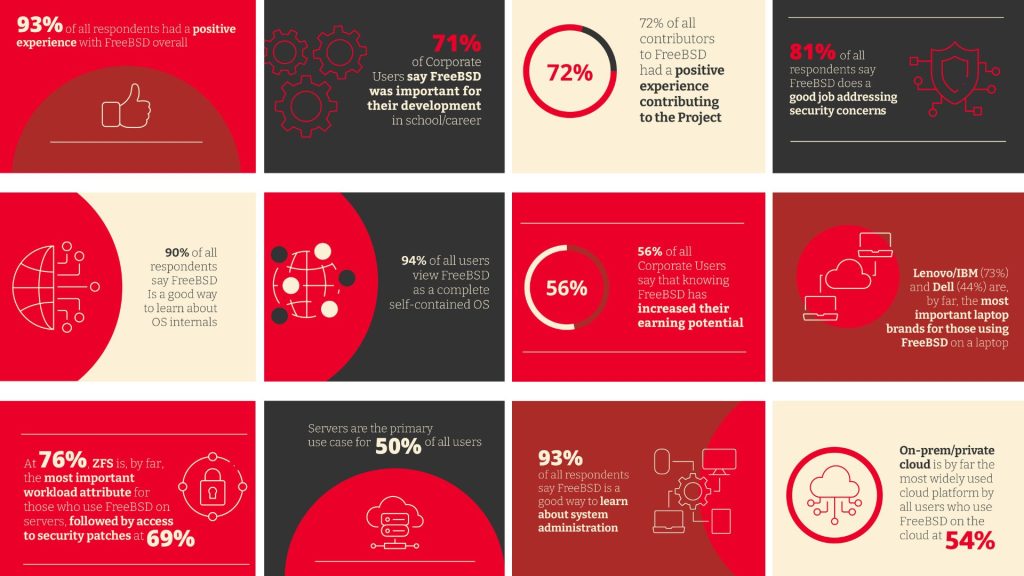Community input is essential for the well-being of any open source community, including FreeBSD. To understand how FreeBSD is used, identify successful community practices, and pinpoint areas for improvement, the FreeBSD Core Team and the FreeBSD Foundation collaborated with the research firm Research Collaborative to survey members of the FreeBSD community.
The survey was conducted online in February 2024, reaching out to members through various channels such as email, Twitter, Facebook, News, Reddit, Hacker News, and other media. It included over 50 closed- and open-ended questions and received 1,446 responses, offering a comprehensive view of the community’s experiences and opinions.
The survey results are now available in the 2024 FreeBSD Community Survey Report. This detailed report provides insights into FreeBSD users’ profiles, usage patterns, perceptions of the FreeBSD Project, and areas where the community sees opportunities for improvement. It is a valuable resource for developing strategies to increase engagement and enhance the FreeBSD user experience.
Key Insights
- User Satisfaction: 93% of respondents had a positive experience with FreeBSD, highlighting strong user satisfaction.
- Comprehensive OS: 94% view FreeBSD as a complete, self-contained operating system.
- ZFS Importance: 76% of server users identify ZFS as the most crucial workload attribute.
- Laptop Preferences: Lenovo/IBM (77%) and Dell (45%) are the currently top laptop brands for FreeBSD users.
- Community Demographics: The typical respondent is 45 years old, based in Europe or North America, and has used FreeBSD for 13-14 years.
- Contribution Rates: Over half have contributed to FreeBSD in the past year, typically every quarter.
- Learning Resources: The FreeBSD website is the primary source for updates, while newer users rely more on Reddit, YouTube, and blogs.
- Security: FreeBSD is praised for its security, especially in server environments.
Actionable Steps
- Expand Community Recruitment: Develop targeted marketing campaigns and educational programs to attract new users, especially through social media and academic channels.
- Enhance Training and Support: Create comprehensive training resources, including tutorials, YouTube content, and workshops for new users and contributors. Establish a mentorship program to support new users.
- Update Documentation: Streamline and update documentation, focusing on organization and removing outdated content. Establish a central resource hub on the website.
- Improve Hardware Support: Prioritize the development of Wi-Fi drivers and other critical hardware support. Collaborate with manufacturers to improve compatibility.
- Clarify Contribution Process: Simplify and clarify the contribution process with clear guidelines, tutorials, and workshops. Implement peer mentorship programs to assist new contributors.
- Engage Non-Dominant Regions: Develop initiatives to engage users from underrepresented regions with region-specific resources, translations, and outreach programs.
The full survey report and raw data* are available for those interested in a deeper dive into the findings.
Note About Nomenclature
In our questionnaire, we initially used the terms “professional” and “hobbyist” to describe our contributors and users. However, “hobbyist” does not accurately reflect our community. Therefore, we have adopted the terms “Corporate User” and “Individuals” in line with the nomenclature used by BSDCan and EuroBSDCon.
* Note that write-in answers have been omitted from the raw data for privacy.

